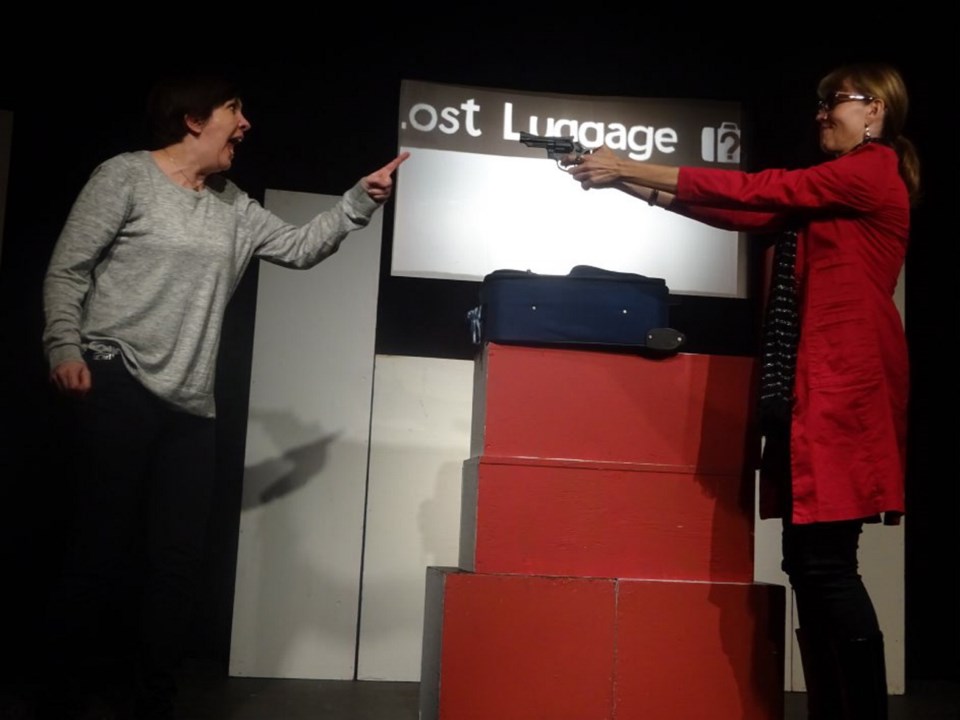At the beginning of the Sarah Ruhl comedy now playing at Theatre Inconnu, a young woman in a café is driven crazy by an incessantly ringing cellphone at a neighbouring table.
We’re instantly hooked, of course — it’s an irritant with which we’re all too familiar. Finally, Jean (the talented Melissa Blank) marches over to the phone’s owner to air her displeasure. She soon realizes he cannot answer, having departed from this life.
But Jean, being Jean, cannot let it go. What happens next not only changes her life, but the lives of those she encounters.
On a basic level, Dead Man’s Cell Phone (2007) is a quirky examination of the mobile phone, that omnipresent gadget we love, hate or merely tolerate as a necessity of modern life.
Such subject matter might seem mundane, but Ruhl is genuinely fascinated by the role of a machine that simultaneously connects and distances us from others. She’s also interested in the broader notion of communication and intimacy, positing — as so many others have — that we humans waft through life in separate solitudes despite our apparent need to be connected at all times.
Despite a few spots of over-cutesiness in the script, Ruhl’s oddball — and sometimes highly original — approach pulls us in hard, particularly when she taps into peculiar pockets of truth regarding the human condition.
The Pulitzer-Prize nominated playwright has Jean embark on a curious mission after Gordon’s passing. Armed with the dead man’s cellphone, she seeks not only to reconnect him with his survivors (a mother, wife and brother), but to rehabilitate his reputation with a series of fibs.
Jean tells his mother, Mrs. Gottlieb — an imperious, nasty woman — that her estranged son tried to call her just before his death. She tells Gordon’s mistress his last words were a declaration of love. And she tells his widow he penned a love letter to her just before expiring — alas, the precious missive was tossed out by a waiter.
Ruhl is a deft hand with funny, absurdist one-liners. For instance, Mrs. Gottlieb, played by Wendy Magahay with Cruella de Vil haughtiness, decries Jean’s seeming ordinariness by saying: “You’re like a very small casserole.”
Ruhl’s characters make confessions that, with curious suddenness, imbue Dead Man’s Cell Phone with power and meaning. Gordon’s widow, Hermia (Sarah Heyman), admits to having indulged in sexual fantasies when they made love. The twist is that she pretended she was her husband’s mistresses. The admission is so singularly bizarre, the play instantaneously tingles with veracity and life.
Gordon — who turns out to have been a black-market vendor of human organs — delivers a passionate post-life monologue about cellphones, his strange occupation and lobster bisque. Despite a momentary memory lapse on opening night, Cam Culham delivered this challenging piece well.
Blank, who has a gift for subtle facial expression, captured Jean’s big-hearted, slightly goofy humanity. This production is also notable for Sophie Fuldauer’s excellent shadow puppets, which add a whimsical beauty to the proceedings. Dead Man’s Cell Phone continues to Oct. 12.
In some ways, Joe DiPietro’s 1998 play Over the River and Through the Woods has the pre-packaged quality of a TV sitcom. It is, however, very cleverly written — and there are sufficient twists to keep us both amused and entertained.
What makes this production truly worth seeking out is a strong Langham Court Theatre cast and a superior set by Jason Vikse, who directs the show with commendable clarity.
Nick is a 29-year-old bachelor who dutifully attends dinners each Sunday with two sets of Italian grandparents. When he tells his family he will be moving to Seattle for a new job, the oldsters devise a cunning plan. They invite a nice young woman for a meal in hopes the pair will hit it off, marry and stay in New Jersey forever.
The comedy pivots around the notion of “tengo famiglia,” translating roughly to “I hold family.” Staying close as family is more important than anything.
DiPietro is skilled at dreaming up funny situations peppered with tart one-liners. When Nick admits he ate at a Chinese restaurant rather than chowing down on Italian fare, uncle Nunzio quips: “That’s like eating cancer.” (Nunzio is played by Ira Shorr, who on Thursday night displayed a canny knack for well-timed comedic repartee.)
Among the more humorous scenes is a rollicking sequence in which the seniors attempt to play Trivial Pursuit. They can’t remember the names of actors, but manage by saying things, like, “You know, it’s him — the guy with the face.”
DiPietro undercuts the play’s inherent sentimentality with several cliché-defying twists and surprises that cannot be revealed here without spoiling the fun.
In recent seasons, Liam McDonald, who plays Nick, has emerged at Langham Court as a strong, confident performer. Once again, he doesn’t disappoint, although his character’s double-forté vitriol in Act I could be leavened with the occasional pianissimo passage.
Each actor delivered at least one admirable monologue. The cast includes David Biltek as Frank, Pam Miller as Aida, Angela Henry as Emma and Emily McFarland as Caitlin.
Judicious spotlighting makes it crystal clear when characters step out of the action to address the audience. The set of a middle-class home is highly detailed, right down to Aida’s spoon-set collection on the wall.
Of special note is a clever revolve set in which a wall flips to allows conversations on the front porch — something that adds much to the show.



